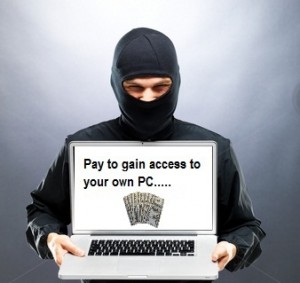From Wikipedia:
Ransomware is a type of malware that prevents or limits users from accessing their system. This type of malware forces its victims to pay the ransom through certain online payment methods in order to grant access to their systems, or to get their data back. Some ransomware encrypts files.
To say that Ransomware has become a serious problem in recent times is putting it mildly. In the last year, numerous SA businesses and users have become victims of this nasty type of malware. According to BlueCoat, a security vendor, Ransomware is now the leading mobile threat and ranks very high on the list of desktop/server threats.
Briefly, Ransomware infection is primarily by email link or email attachment. Once the user clicks a link in the infected email or runs the attachment, the infection silently takes place. From there, files accessed by the user are encrypted with a key, known only by the malware author. A message ( in the form of a file typically called HELP_DECRYPT.TXT ) is left in the folder where the file was first encrypted – the message provides details of how to send payment, often in bitcoins, to the malware author, so that they will send the key to unencrypt your files.
CryptoWall 3 and earlier versions, as well as some competing malware, targeted specific files that you accessed. Newer variants like CrytoWall 4 will now encrypt an entire folder and not just the files you access. They also have the ability to infect/encrypt files on the network shares of servers. Chimera is a new type of Ransomware that threatens to post copies of your documents and images on the Internet unless a ransom is paid. PowerWorm has recently come to light as another variant that encrypts files – but it has a bug in that the key is destroyed ( mistakenly ) after encryption. Which means that paying a ransom will not get you your files back – ever.
Another method of infection is through websites that are compromised by the Angler exploit kit. Just visiting the site results in a drive-by attack called Pony which scours the infected computer for any login credentials for websites, banking, network resources and applications. Once done, the infected computer is then redirected to alternate sites where Angler will install CryptoWall 4 which in turn will result in encrypted files. CryptoWall 4 also renames files with randomly generated characters meaning that you don’t even know which files have been encrypted.
This is real scary stuff …
Paying, what amounts to around R 5,000 – 30,000 ( 1 – 6 bitcoins ) per infection, is beyond the ability of most. Another issue is that there is no guarantee that the perpetrator will actually send you the encryption key. Paying a ransom is not a good idea …
What can I do to protect myself?
- always keep your Operating System and installed applications up to date
- do not use Adobe Flash and plugins for browsers, and try to limit your usage of Java
- make sure you have a good Anti-Virus package installed and make sure it is updated continuously
- do NOT click on links in emails ( even if they look genuine ) and do not save or run attachments from emails that appear to be from friends, family or known business connections
- use common sense and logic when accessing email and visiting websites; look for things that are out of the ordinary and double check items that look ordinary
- attend Security Awareness Training which gives you the tools to navigate email, websites and other internet applications safely
- backup your data regularly
What can I do if I’m infected?
The answer to this is: nothing – if you’ve not followed the last recommendation above. The only option is to clear out the infection and restore data from backups. Clearing out the infection often means rebuilding the infected device from scratch, reinstalling all applications and restoring your data.
If you don’t have a backup, then there are no further options. Unless you want to take a chance and have the funds available to pay the ransom ….

